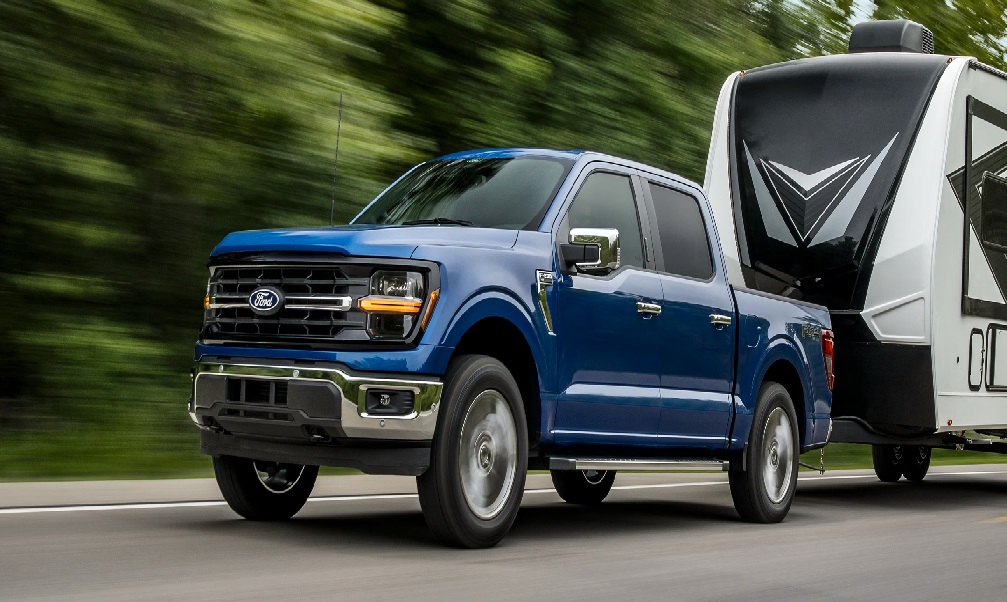What is the Concept of Curb Weight?
Curb weight is a crucial specification when it comes to understanding the capabilities and performance of a vehicle. For the Ford F-150, the curb weight refers to the truck’s total weight, including all standard equipment and fluids, but excluding the weight of passengers, cargo, and any additional accessories or modifications. This measurement provides a baseline for the vehicle’s weight, essential for determining payload capacity, towing capabilities, and overall driving dynamics.
The curb weight of a vehicle is an important consideration for both consumers and manufacturers. It helps consumers understand the practical limitations of the truck, such as how much weight it can safely carry while informing manufacturers about the engineering and design requirements needed to produce a capable and efficient vehicle.

What Affects the Curb Weight of a Ford F-150?
The curb weight of a Ford F-150 can be influenced by several factors, including the truck’s trim level, cab size, bed length, and drivetrain configuration. Understanding how these elements impact the vehicle’s overall weight is crucial for making informed purchasing decisions and ensuring this Ford truck meets the user’s specific needs.
Are There Trim Level Variations in F-150 Weight?
The Ford F-150 is available in a wide range of trim levels, each with unique features and equipment. As a result, the truck’s curb weight can vary significantly depending on the specific model. For example, the base XL trim may have a curb weight several hundred pounds lighter than the top-of-the-line Limited or Raptor models, which have more advanced technology, luxury features, and performance-oriented components.
- XL Trim: The base XL trim typically has a curb weight that ranges from around 4,069 to 4,866 pounds, depending on the cab size and drivetrain configuration.
- XLT Trim: The XLT trim level generally has a curb weight between 4,173 and 5,011 pounds.
- Lariat Trim: The Lariat trim has a curb weight typically ranging from 4,348 to 5,086 pounds.
- King Ranch Trim: The King Ranch trim level has a curb weight ranging from 4,472 to 5,210 pounds.
- Platinum Trim: The Platinum trim has a curb weight that typically falls between 4,472 and 5,210 pounds.
- Limited Trim: The top-of-the-line Limited trim has a curb weight ranging from 4,472 to 5,210 pounds.
- Raptor Trim: The high-performance Raptor trim has a curb weight that typically falls between 5,525 and 5,697 pounds.
The Impact of Cab Size on an F-150’s Overall Weight
The cab size of the Ford F-150 is another factor that can significantly impact the truck’s overall curb weight. This pickup truck is available in three different cab configurations: Regular Cab, SuperCab, and SuperCrew.
- Regular Cab: The Regular Cab configuration is the lightest, with a curb weight typically ranging from 4,069 to 4,593 pounds.
- SuperCab: The SuperCab version has a slightly higher curb weight, typically ranging from 4,173 to 4,697 pounds.
- SuperCrew: The largest SuperCrew cab configuration has the highest curb weight, typically ranging from 4,348 to 4,872 pounds.
How Does Bed Length Affect the F-150’s Weight?
The length of the truck bed can also play a role in the overall curb weight of a truck. Generally, the longer the bed, the heavier the vehicle will be.
- 5.5-foot Bed: Models with the shorter 5.5-foot bed typically have a curb weight that ranges from 4,173 to 4,872 pounds.
- 6.5-foot Bed: Models with the 6.5-foot bed have a curb weight that typically falls between 4,248 and 4,947 pounds.
- 8-foot Bed: The longest 8-foot bed option for the F-150 has a curb weight ranging from 4,323 to 5,022 pounds.
What’s the Weight Difference Between the 2WD vs. 4WD?
The drivetrain configuration of the Ford F-150 can also impact the truck’s curb weight. Specifically, the difference between 2-wheel drive (2WD) and 4-wheel drive (4WD) models can be notable.
- 2WD Models: Models with 2-wheel drive typically have a curb weight several hundred pounds lighter than their 4WD counterparts. The curb weight for 2WD F-150s can range from 4,069 to 4,872 pounds.
- 4WD Models: Models with 4-wheel drive have a curb weight that typically falls between 4,248 and 5,050 pounds, depending on the cab size, bed length, and trim level.
What is the F-150’s Weight Compared to Payload Capacity?
The curb weight of your Ford pickup is an important consideration regarding the truck’s payload capacity. Payload capacity refers to the maximum weight the vehicle can safely carry, including passengers, cargo, and other equipment or accessories.
On average, the payload capacity of the Ford F-150 ranges from around 1,500 to 3,250 pounds, depending on the specific model and configuration, meaning that the truck’s total weight, including its curb and payload, should not exceed the vehicle’s Gross Vehicle Weight Rating (GVWR).
What Does Gross Vehicle Weight Rating (GVWR) Mean?
The Gross Vehicle Weight Rating (GVWR) is a crucial specification that determines the maximum allowable weight of a fully loaded vehicle, including the curb weight, passengers, cargo, and any additional equipment or accessories. Exceeding the GVWR can compromise the vehicle’s handling, stability, and braking performance, potentially leading to safety issues.
For the Ford F-150, the GVWR can range from around 6,000 to 8,200 pounds, depending on the specific model and configuration. It’s essential for owners to understand their GVWR and to ensure that the total weight of the vehicle, including its payload, does not exceed this limit.
How Does Engine Choice Influence the Weight of the F-150?
The engine selection can also play a role in the overall curb weight of your Ford pickup truck. Larger, more powerful engines tend to add more weight to the vehicle, while smaller, more fuel-efficient engines generally result in a lower curb weight.
- V6 Engines: F-150 models have V6 engines, such as the 3.3L, 2.7L, or 3.5L EcoBoost, which typically have a curb weight that falls on the lower end of the spectrum, ranging from around 4,069 to 4,872 pounds.
- V8 Engines: F-150 models with V8 engines, such as the 5.0L or 6.2L options, generally have a higher curb weight, typically ranging from 4,348 to 5,210 pounds.
- Diesel Engines: The 3.0L Power Stroke diesel engine option for the F-150 adds additional weight to the vehicle, resulting in a curb weight ranging from 4,472 to 5,210 pounds.
To determine the best Ford F-150 configuration for your needs, consider the various factors impacting the truck’s curb weight and overall capabilities. By understanding the relationship between weight, payload capacity, and GVWR, you can make an informed decision that ensures the F-150 you choose is the perfect fit for your specific requirements.



